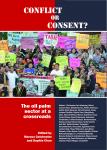
Malamoi Customary Council, Reject the Presence of Palm Oil Companies in Their Territory
18 Oct 2021
On 14 October 2021 in Keik Malamoi, Sorong City, around 70 representatives of the Moi indigenous people, elders and customary land and forest owners, came from the Seget District, Bagun District, Klamono District, Segun District , Konhir District, Klayili District and Sayosa District, participated in the customary session held by the LMA Malamoi. The customary assembly is led by five Nedinbulu (customary judges).





